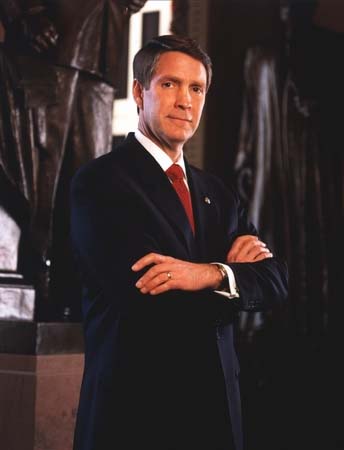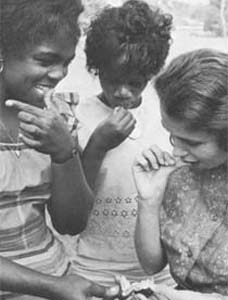
Senator Bill Frist used the opportunity to promote the idea of a Global Health Corps, modeled on the Peace Corps, which would use American volunteers to assist in overseas medical projects
U.S. vows to beef up tsunami warning system
HEARING: Stevens and Inouye unhappy about inoperable buoys.
By RICHARD MAUER
Anchorage Daily News
Published: February 3rd, 2005
Last Modified: February 3rd, 2005 at 03:22 AM
WASHINGTON -- The government plans to quadruple the number of tsunami monitoring buoys in the Pacific Ocean and extend the warning system to the Atlantic over the next two years, officials told a Senate hearing Wednesday.
But agency representatives came under fire at the Senate Commerce Committee from chairman Ted Stevens, R-Alaska, and his co-chairman and Democratic ally from Hawaii, Daniel Inouye, for failing to alert Congress that half the existing six buoys are inoperable, one for more than a year.
Pledging "considerable improvement" at the nation's two warning centers -- one in Palmer and the other at Ewa Beach, Hawaii -- Jack Marburger, President Bush's director of science and technology policy, said monitoring agencies would provide "more comprehensive coverage and faster alerts."
Officials also pledged to work cooperatively with the United Nations and other agencies in areas such as the Indian Ocean, scene of the devastating Dec. 26 tsunami. In addition, they pledged to operate the warning centers 'round the clock, and to improve seismic and ocean monitoring systems so that they transmit their information "in real time."
The Senate Commerce, Science and Transportation Committee hearing was on the Tsunami Preparedness Act of 2005, which is designed to strengthen the National Oceanic and Atmospheric Administration's ability to detect, predict and warn coastal residents of tsunamis, and to mitigate the damage from the massive waves. In addition to authorizing improvements to the current system and extending it globally, the bill would also require the administration to notify Congress of equipment breakdowns and report annually on failures and successes.
Stevens and Inouye were clearly unhappy that the current system has been operating for some time at less than full strength.
"If it weren't for the tragedy of biblical proportions, it's likely that you would not have notified?" Inouye asked, referring to the Dec. 26 tsunami.
"Yes, actually we wouldn't have," acknowledged John Kelly, deputy commerce undersecretary for oceans and atmosphere.
Two of the three buoys off the Aleutian Islands are on the blink, one since August, the other since December. A Pacific Northwest buoy off Washington has been dead since October 2003, Kelly said. The buoys help determine whether an earthquake, volcano or such event, detected by other means, has generated a tsunami.
Bad weather has prevented repair of the Alaska buoys, while technical problems have plagued the Pacific Northwest one.
The detection equipment not only warns of impending disaster, it can do the opposite, Inouye noted. In November 2003, Hawaii saved an estimated $70 million in emergency response expenses when the buoys helped determine quickly that an earthquake hadn't produced the massive tsunami initially predicted.
Other witnesses stressed the need to continually educate coastal residents about the risks from the sea. The best deep-water monitoring system can't save lives if residents can't be alerted in time or don't know what kind of action to take.
That point was driven home by Sen. Mary Landrieu, D-Louisiana, who toured the stricken region with Senate Majority Leader Bill Frist, R-Tenn. Both testified before the committee.
Landrieu said that while the devastation extended for thousands of miles of coastline, it rarely penetrated inland deeper than 100 yards.
"People could have simply walked to safety," she said, if only a warning system had been in place. "The smallest of toddlers, the frailest of seniors can walk the length of a football field."
Because a localized tsunami can be generated from a nearby earthquake, many coastal regions of Alaska might get very short notice of an impending disaster.
Stevens suggested that emergency shelters could be built, as he witnessed the Navy doing on the Aleutians during World War II.
Frist used the opportunity to promote the idea of a Global Health Corps, modeled on the Peace Corps, which would use American volunteers to assist in overseas medical projects.
Daily News reporter Richard Mauer can be reached at rmauer@adn.com or 1-202-383-0007.








